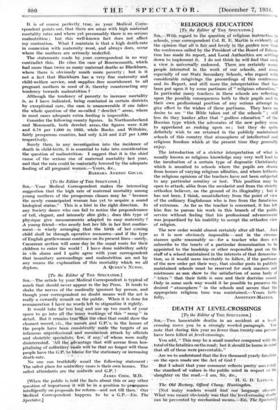RELIGIOUS EDUCATION
[To,the Editor of Tim SPECTATOR.] Srit,7-With regard to the question, of religious instruction in , schoolS,_ Your correspondent Col. R, E. Martin is evidently of
•
the opinion that all is fair and lovely in the garden now that the conference-called by the President of the Board of Educa- tion has made its report, and Local Authorities, are settling flown to impleme,nt it, I do not think he will find that such a view, is universally endorsed. There are certainly many people interested in the work of our schools, and more especially of our State Secondary Schools, who regard with considerable misgivings the proceedings of this conference and its . Report, and still more the ,interpretation that has lee41 Put upon it by some pmtisans of " religious education." In particular many teachers in these schools are reflecting upon the possible consequences both to their pupils and to their own _professional position of any serious attempt to give effect to the wishes Of these partisans. They have no desire to see " the Bible taken out of the schools " ; still less do they, hanker after that "godless education " of the Russian type which, the advocates of the new policy seem to apprehend , as rushing upon us ; but they do quite definitely wish .to see retained in the publicly maintained schools of this country that atmosphere of intellectual and religious freedom which at the present time they generally enjoy.
The introduction of- a stricter interpretation of what is usually known as religious knowledge may very well lead to the inculcation. of a certain type of dogmatic Christianity which is unsuited to schools where the pupils are drawn from homes of varying. religious affinities, and where hitherto the religious opinions of the teachers have not been subjected to any particular scrutiny or test. This position may be open to-attack, alike from the secularist and from the strictly orthodox believer, on the ground of its illogicality ; but it has not been, I think, unsatisfactory from the point of view of the ordinary Englishman who is free from the fanaticism of extremes. .As far as the teacher is concerned, it has left him free to pursue his work in this branch of the public service without feeling that his professional advancement was jeopardized by his inability to accept the orthodox view of religion.
The new order would almost certainly alter all that. Just as it is now obviously impossible —and in the circum- stances quite.. reasonably so—for a teacher 'who does nit subscribe to the tenets of a particular denomination to be appointed -to the headship or other responsible post on the ,staff of a school maintained in the interests of that denomina- tion, so it would seem inevitably to follow, if the partisans of the new order get their way, that similar posts in publicly ;maintained schools must be reserved for such masters and mistresses as ,can sliow to the satisfaction of some body of " triers " that their -faith, is sure and their doctrine sound. -Only- in some such way would it be possible to preserve the desired .‘.‘ atmosphere ". in the schools and secure that the appropriate religious tone was maintained.—Yours faith-


















































 Previous page
Previous page